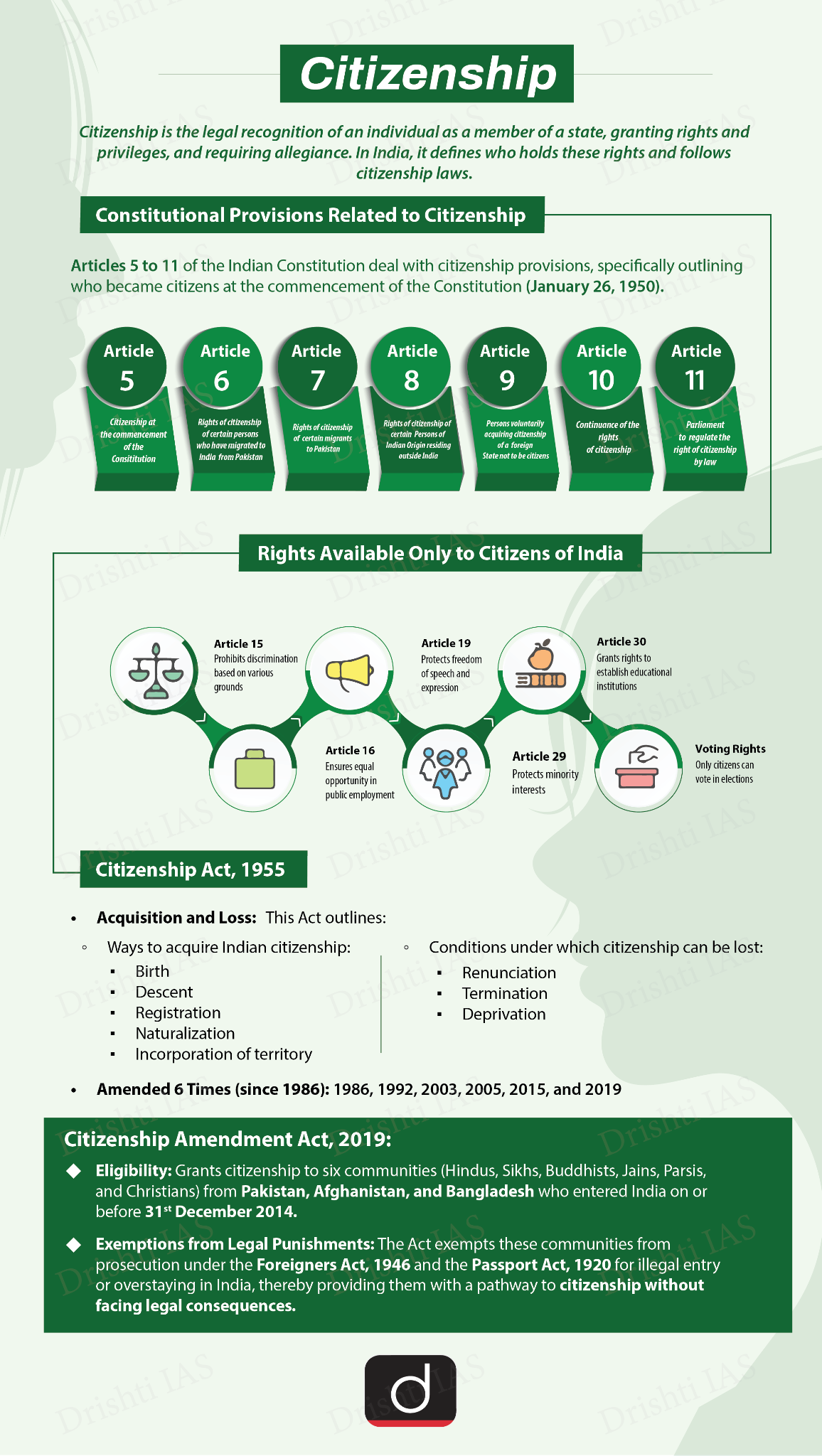Indian Polity
Debate on Dual Citizenship for Indians
- 02 Apr 2025
- 8 min read
For Prelims: Citizenship, Overseas Citizenship of India, Remittances, Foreign Direct Investment, Article 9, Know India Programme
For Mains: Role of the Indian Diaspora, Dual Citizenship for India, Constitutional Provisions on Citizenship
Why in News?
The debate on dual citizenship for Indians has resurfaced. As India hosts the world’s largest diaspora, discussions are growing on whether genuine dual citizenship, rather than just the Overseas Citizenship of India (OCI), would better align with India’s evolving diaspora policy and global realities.
Note: Dual citizenship grants individuals legal status in multiple countries, allowing passport issuance, political participation, visa exemptions, and employment rights.
What is the Debate on Dual Citizenship for Indians?
Arguments in Favour
- Largest Diaspora: Over 3.5 crore Indians live abroad (nearly one in 40 Indians). India is the top recipient of remittances globally, with USD 129 billion received in 2024, far surpassing foreign direct investment (FDI) inflows of USD 42 billion.
- Limitations of OCI: The OCI is not actual dual citizenship. It does not confer political rights (e.g., voting, holding public office) or allow ownership of agricultural land.
- It is seen more as a privilege than a right, and can be revoked unilaterally, reducing its security and appeal.
- Many Indians abroad feel that OCI status makes them second-class citizens, weakening their connection with India.
- Policy Inflection Point: Measures like the US policy of ending birthright citizenship reflect the hardening global climate toward migrants, raising the need for dual citizenship.
- Additionally, many Indians are renouncing their citizenship to secure rights in foreign countries, an emotionally difficult step that genuine dual citizenship could help mitigate.
- Strategic Engagement: A globally integrated Indian citizenry strengthens India's soft power and international influence, while dual citizenship could unlock greater diaspora investment, political advocacy, and cultural linkage, supporting the government's aim of positioning the global Indian community as a national asset.
- Comparative Trends: Numerous countries, including the US, Canada, Australia, the United Kingdom, France, and Germany permit dual citizenship with tailored safeguards.
- India, with proper legal architecture, could do the same without compromising national security.
Arguments Against
- Constitutional Restrictions: The Indian Constitution (Article 9) does not permit dual citizenship. Acquiring foreign nationality leads to automatic loss of Indian citizenship.
- Democratic Legitimacy: Citizenship is inherently linked to undivided allegiance. Dual citizens voting or holding office in India while being citizens of another state challenges democratic sovereignty.
- Political Instrumentalism: Experts warn of a “comprador class” (individuals who exploit dual nationality for personal or economic gain without genuine loyalty to India).
- Dual citizenship can increase the risk of external influence in domestic politics through diaspora lobbying or funding.
- Security and Strategic Concerns: The original rationale behind India’s strict citizenship framework was to clearly demarcate citizens post-Partition.
- Allowing dual citizenship could open legal grey zones in security-sensitive matters, especially if the individual is involved in sensitive professions abroad.
- Sufficient Existing Framework: Experts argue that the OCI program ensures diaspora engagement without political rights, maintaining sovereignty while enabling economic collaboration and contributions through channels like FDI and remittances, making dual citizenship unnecessary.
What are the Middle-path Reforms on the Issue of Dual Citizenship?
- Enhancing the OCI Framework: Provide greater legal stability and rights (e.g., land ownership for certain categories, easier business rules). Ensure due process and transparency in revocation or denial of OCI status.
- Participatory Mechanisms: India could consider allowing limited political participation for OCIs at the local governance level, such as panchayats.
- OCIs at the panchayat level can drive knowledge exchange, investment, and development, leveraging global expertise to improve local governance.
- This would also enable diaspora engagement without granting national elections voting rights. Such a model balances diaspora inclusion with constitutional safeguards.
- Additionally, at the national level, institutionalize diaspora advisory councils through platforms like the Global Indian Network of Knowledge (Global-INK) without extending political franchise.
- Cultural Identity Programs: Expand the coverage of programs like Tracing the Roots (a Ministry of External Affairs initiative helping Persons of Indian Origin (PIOs) trace their ancestry in India), Know India Programme, and scholarship schemes for diaspora youth to strengthen their connection with Indian heritage.
- Selective Dual Citizenship: If ever introduced, restrict it to citizens of strategic partner nations, with clear exclusions for high offices and sensitive roles.
Conclusion
As the world becomes more interconnected, India's approach to citizenship must evolve. Enhancing OCI rights and adopting middle-path reforms can foster deeper diaspora engagement. A pragmatic, phased approach balances national interests while embracing global realities.
|
Drishti Mains Question: Examine the constraints preventing dual citizenship in India. Should India reconsider its stance? Justify your view. |
UPSC Civil Services Examination, Previous Year Questions (PYQs)
Prelims
Q. With reference to India, consider the following statements: (2021)
- There is only one citizenship and one domicile.
- A citizen by birth only can become the Head of State.
- A foreigner once granted citizenship cannot be deprived of it under any circumstances.
Which of the statements given above is/are correct?
(a) 1 only
(b) 2 only
(c) 1 and 3
(d) 2 and 3
Ans: (a)
Q. Consider the following statements: (2018)
- Aadhaar card can be used as a proof of citizenship or domicile.
- Once issued, Aadhaar number cannot be deactivated or omitted by the Issuing Authority.
Which of the statements given above is/are correct?
(a) 1 only
(b) 2 only
(c) Both 1 and 2
(d) Neither 1 nor 2
Ans: (d)





